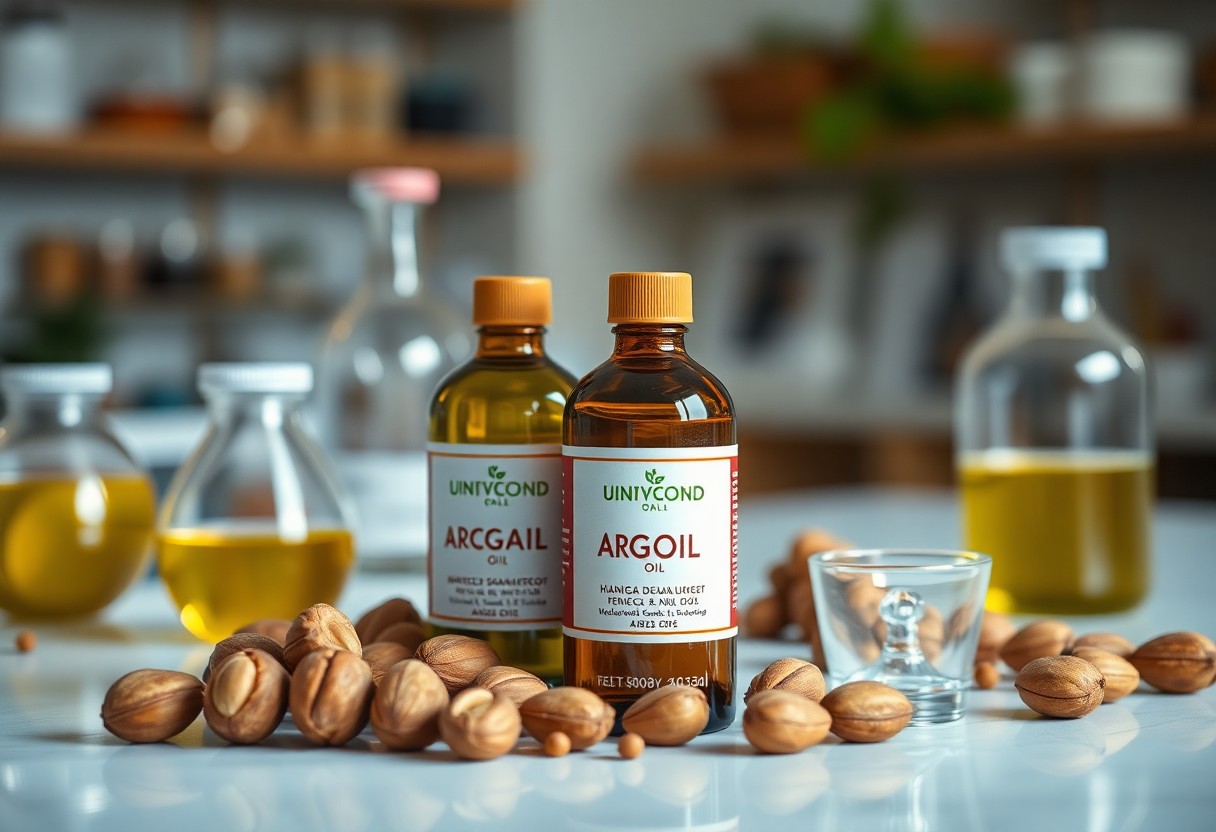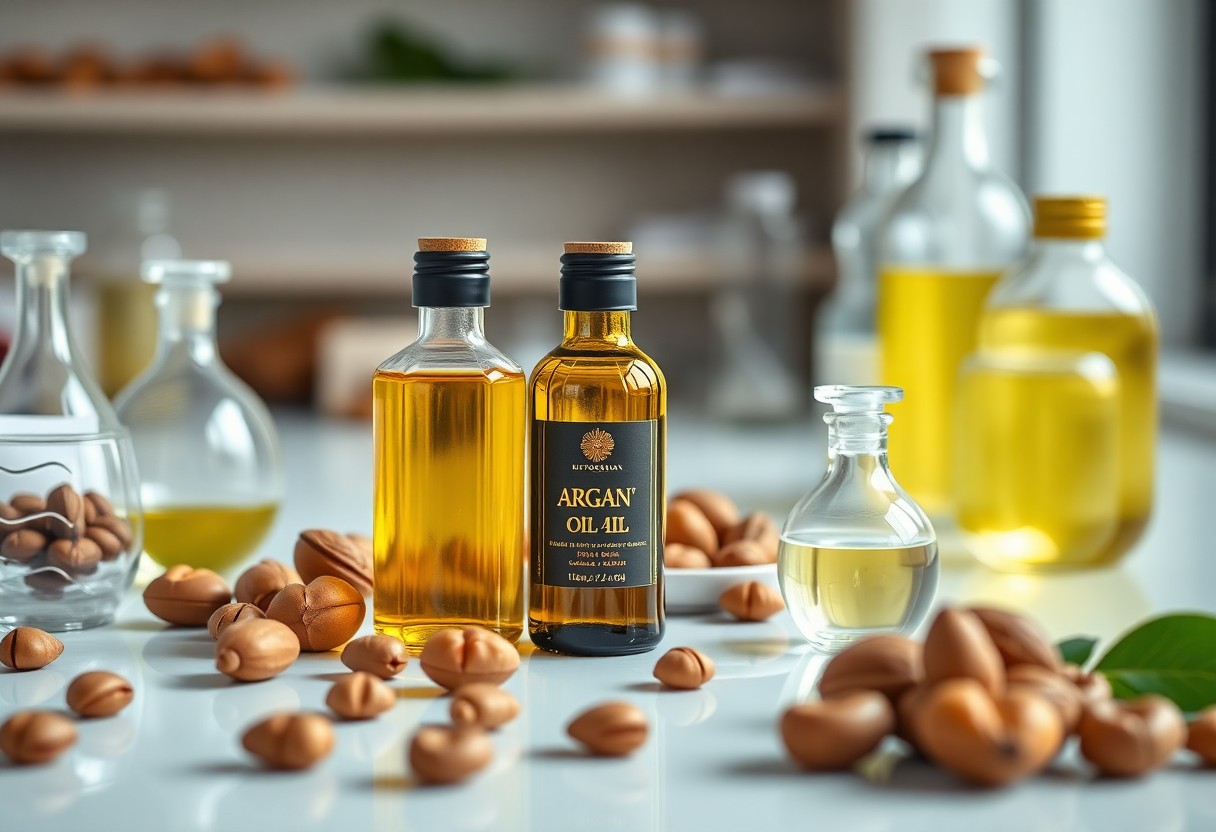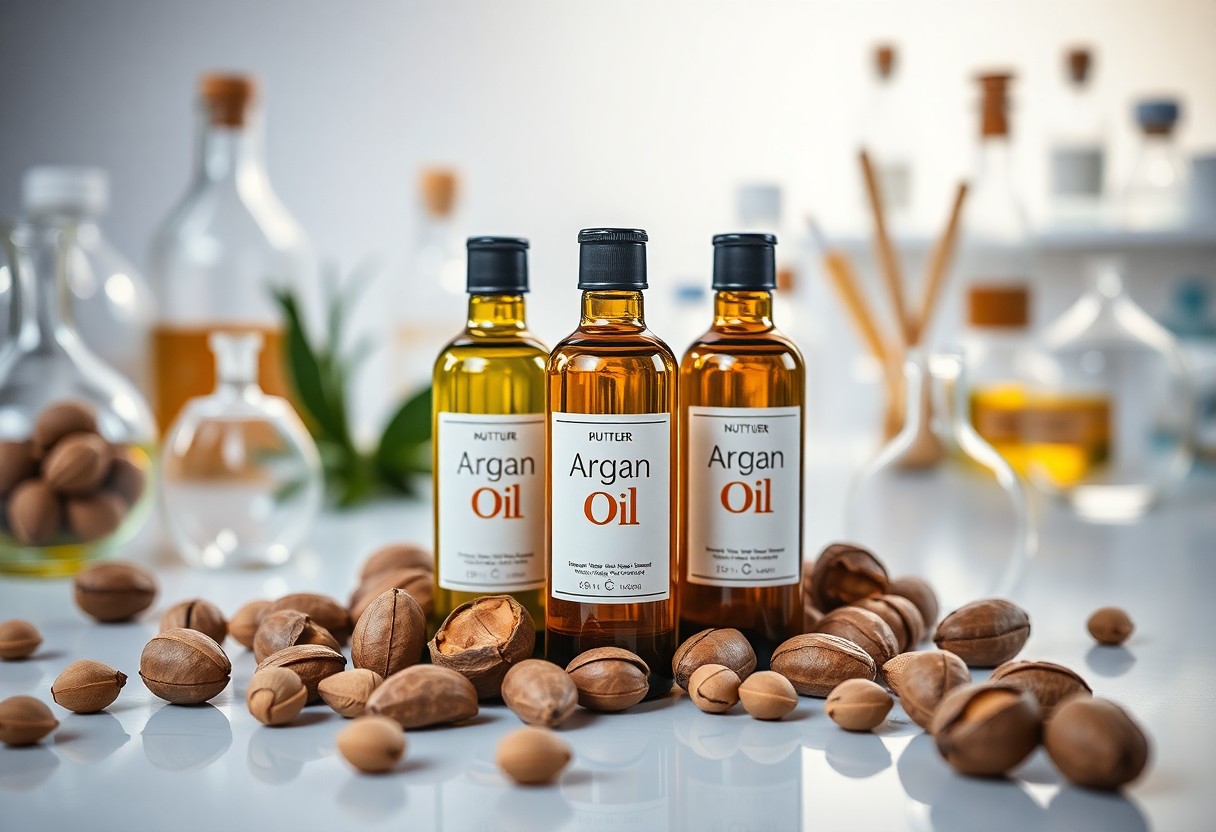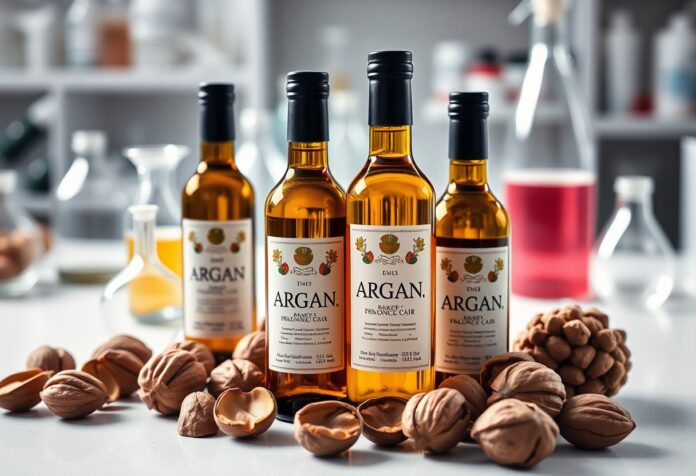Over the years, the therapeutic potential of argan oil has captured the attention of researchers and health enthusiasts alike. As you investigate into the intricacies of its bioactive compounds, you may discover how these unique properties could be woven into advanced nutraceutical innovations. By understanding the science behind argan oil, you can appreciate its role in a new frontier of health and wellness, propelling your knowledge to new dimensions where nature’s bounty meets modern science.
Key Takeaways:
- Bioactive compounds in argan oil offer potential health benefits, contributing to innovations in the nutraceutical sector.
- Antioxidants present in argan oil may help combat oxidative stress, which is linked to various chronic diseases.
- Anti-inflammatory properties of argan oil components can support the development of dietary supplements aimed at reducing inflammation.
- Nutrient absorption enhancement through argan oil could lead to more effective delivery systems for vitamins and minerals in nutraceuticals.
- Skin health benefits from argan oil are being explored, paving the way for potential applications in cosmetic nutraceuticals.

Understanding Argan Oil
Before delving into the advanced nutraceutical innovations that may arise from argan oil’s bioactive compounds, it is imperative for you to grasp the richness of this remarkable oil. Extracted from the nuts of the Argania spinosa tree, native to Morocco, argan oil has long been cherished for its culinary, cosmetic, and medicinal properties. The intricate blend of nutrients contained within this oil places it at the intersection of tradition and modern science, making it a subject worthy of inquiry as we explore its potential in advanced nutraceutical applications.
Historical Context
One must appreciate that the significance of argan oil is deeply rooted in the Berber culture of Morocco, where it has been utilized for centuries. Historically, the oil was traditionally used in a variety of ways—from being a source of nutrition in culinary dishes to serving as a skin moisturizer. The knowledge of this oil’s benefits has been transmitted through generations, with local women often gathering and processing the nuts, creating not only a source of sustenance but also a means of economic empowerment. As global attention has turned toward organic and natural products, argan oil has garnered international acclaim, prompting research that underscores both its historical relevance and its intriguing potential in modern health science.
Nutritional Profile
If you examine the nutritional profile of argan oil, you will discover an array of bioactive compounds that may hold promise for innovative nutraceutical applications. It is rich in imperative fatty acids, particularly oleic and linoleic acids, which promote heart health and have anti-inflammatory properties. Additionally, the oil is a source of valuable antioxidants, such as vitamin E, which is known for its capacity to combat oxidative stress, a factor implicated in a range of health issues. Furthermore, argan oil includes phytosterols, which may assist in lowering cholesterol levels and enhancing overall cardiovascular health.
Profile your understanding with the fact that argan oil isn’t merely a culinary delight; it is a veritable treasure trove of nutrients. The presence of polyphenols complements its antioxidant effects, while its phytosterols function synergistically to contribute to the oil’s overall health-promoting capabilities. Integrating argan oil into your diet or wellness routine could potentially enhance your health profile, making it an intriguing subject for ongoing scientific exploration and personal application within nutraceutical innovations.
Exploring Bioactive Compounds
You may find yourself intrigued by the profound implications that argan oil’s bioactive compounds hold for nutraceutical innovations. The remarkable synergy of these compounds can pave the way for cutting-edge developments in nutritional science, enhancing the way we approach health and wellness. From skin nourishment to lipid metabolism, the multifaceted applications of argan oil’s constituents illustrate the potential for creating advanced products that can address an array of modern health challenges.
Key Components of Argan Oil
Some of the key components of argan oil include important fatty acids, tocopherols, phytosterols, and polyphenols. These bioactive constituents play important roles in promoting health benefits—from anti-inflammatory properties to antioxidant effects which contribute to cellular protection. The presence of oleic and linoleic acids, for instance, is significant as they are important for maintaining healthy skin and promoting heart health, demonstrating how a single natural oil can have a wide-ranging impact on human physiology.
Mechanisms of Action
There’s an intricate web of interactions that take place at a molecular level when argan oil is consumed or applied topically. The bioactive compounds present in argan oil may engage in various mechanisms: modulating oxidative stress, influencing cell signaling pathways, and promoting wound healing, amongst others. These actions highlight the potential of argan oil not just as a culinary delight but as a compelling ingredient in nutraceutical formulations.
For instance, the polyphenols in argan oil have been shown to inhibit the activity of harmful free radicals, thus reducing oxidative damage within the body. This antioxidant action is complemented by the oil’s ability to modulate inflammatory responses, allowing it to function effectively in combating inflammation-related diseases. As you examine deeper into the science surrounding these mechanisms, you may recognize that the potential applications of argan oil in the field of nutraceuticals are nearly limitless, providing an avenue to create innovative health solutions that can profoundly influence well-being.

How-to Leverage Argan Oil
Keep in mind that incorporating argan oil into your daily regimen can yield dramatic benefits for both your health and well-being. By understanding argan oil’s rich bioactive compounds, you can create a personalized approach that aligns with your lifestyle. You may find it helpful to explore resources on Argan Oil: Chemical Composition, Extraction Process, and …. Whether you choose to consume it directly, use it as a salad dressing, or incorporate it into smoothies, the versatility of argan oil allows it to blend seamlessly into various dishes. Furthermore, its exceptional antioxidant properties can provide cellular protection, supporting your body’s natural defenses in the dynamic environment that surrounds you.
Incorporating into Daily Regimen
You might consider selecting high-quality argan oil products that complement your dietary needs. A few drops can effortlessly enhance your morning routines; perhaps in your oatmeal or yogurt, bringing a nutty flavor and nourishing benefits. Including argan oil in your cooking can also enrich dishes with important fatty acids and vitamins. It is recommended to monitor how your body responds and adjust the quantity to suit your unique requirements, thus personalizing your approach to health and wellness.
Formulating with Other Nutraceuticals
Other valuable nutraceuticals can amplify the health benefits of argan oil, creating a synergistic effect that enhances your overall nutritional profile. By combining argan oil with supplements such as omega-3 fatty acids, Coenzyme Q10, or even vitamin E, you can craft a powerful health regimen that addresses multiple areas of concern. Innovations in nutraceutical formulations pave the way for exponentially greater benefits, transforming your pursuit of wellness into a comprehensive approach.
Leverage the adaptogenic properties of other nutraceuticals, merging them with the potent compounds found in argan oil to cultivate a bespoke formula that meets the challenges of modern life. By being selective in your combinations, you are more likely to achieve a finely tuned equilibrium of nutrition that addresses inflammation, boosts energy levels, and supports cognitive function. This holistic strategy can not only optimize the individual benefits of each ingredient but also enhance your overall quality of life.
Tips for Optimizing Efficacy
After delving into the potential benefits of argan oil, it becomes evident that maximizing its efficacy can significantly influence your experience with its bioactive compounds. To harness the power of argan oil, you should implement the following strategies:
- Choose high-quality, cold-pressed argan oil to preserve its beneficial properties.
- Incorporate the oil into your daily routine for consistent results.
- Combine argan oil with complementary nutrients to enhance absorption and overall effect.
- Store the oil in a cool, dark place to maintain its potency.
- Consult with a healthcare professional to ensure your approach aligns with your health needs.
Perceiving the nuances of how you engage with argan oil can lead to profound insights into its application and benefits, effectively expanding your understanding of its nutraceutical potential.
Dosage Recommendations
Optimizing your approach to dosage is necessary to fully realize the advantages of argan oil. Although specific recommendations can vary based on individual needs and health considerations, starting with one to two teaspoons daily can serve as a general guideline. This amount allows you to assess how your body reacts while providing a balance between effectiveness and safety.
As you increase the dosage, you should observe how your body responds to higher levels of these bioactive compounds. Due to the varying compositions of argan oil products, it is advisable to consult with health professionals who can assist in tailoring a dosage that aligns with your specific health goals and needs.
Best Practices for Preparation
You can significantly enhance the efficacy of argan oil by employing proper preparation techniques. Preferably, integrate argan oil into your meals as a dressing or dip rather than applying it through high-temperature cooking, which can reduce its nutritional value. When using argan oil topically, always cleanse your skin to facilitate better absorption, enhancing its moisturizing and healing properties.
Another effective practice involves blending argan oil with other natural ingredients such as honey or necessary oils, thus creating synergistic effects that amplify the benefits. This combination not only enhances the sensory experience but also stimulates additional nourishing properties, thereby allowing the argan oil to shine within the context of a holistic regimen. Ultimately, through mindful preparation and combination, you can unlock the full potential of argan oil’s bioactive compounds in your daily life.
Factors Influencing Bioactivity
Once again, it is important to consider the various factors that influence the bioactivity of argan oil’s bioactive compounds. The plant’s environment, cultivation methods, and extraction techniques play significant roles in determining the oil’s nutritional and therapeutic potentials. Variations in soil quality, climate conditions, and even harvesting times can create marked differences in the concentration of beneficial compounds. Additionally, the methods used during processing—whether cold-pressing or refining—can deeply impact the stability and potency of these compounds within the final product.
- Soil quality and composition
- Climate variations during growth
- Harvesting techniques and timing
- Extraction methods employed
- Storage conditions after extraction
Recognizing the significance of these influencing factors can enhance your understanding of argan oil’s potential as a nutraceutical. For a deeper exploration of these aspects, refer to the study on Argan oil: Occurrence, composition and impact on human health.
Quality of Argan Oil
Quality is a determining factor in the efficacy of any nutraceutical, and argan oil is no exception. Premium-grade argan oil typically arises from nuts harvested from well-cultivated trees, subjected to minimal processing while preserving its intrinsic bioactive compounds. These higher-quality oils are more likely to contain substantial amounts of antioxidants, important fatty acids, and sterols, which are pivotal for your body’s health. On the flip side, lower-grade oils may undergo excessive refining, leading to a loss of vital nutrients and potentially diminishing the potential health benefits.
To ascertain the quality of argan oil, consider factors such as the oil’s color, aroma, and taste. Authentic oils tend to have a golden hue, a rich nutty aroma, and a distinct flavor. Furthermore, reputable brands will typically provide information regarding their extraction processes and sourcing ethics, which can give you greater confidence in their product’s quality. Ensuring that you use high-quality argan oil is pivotal to reaping its numerous health benefits.
Individual Differences in Absorption
You must appreciate that bioactive compounds, although beneficial, are not uniformly absorbed by all individuals. Variations in metabolism, gut health, and even genetic predispositions can significantly influence how well your body utilizes the nutrients present in argan oil. The hydration levels and the presence of other food components consumed alongside the oil can also make a difference in bioavailability. Thus, personalizing your approach to supplementation can aid in maximizing the benefits of argan oil.
Understanding these varying individual responses to nutrient absorption empowers you to tailor your nutritional choices effectively. Engaging with healthcare professionals or nutritionists can provide additional insights into your specific needs and guide you toward creating an optimal nutraceutical regime that includes argan oil. This customization can ultimately enhance your overall health experience and lead to more significant health outcomes.

Future Directions in Nutraceutical Innovations
Despite the growing interest in the bioactive compounds of argan oil, the potential for these elements to catalyze advanced nutraceutical innovations remains largely untapped. As the benefits of these compounds are elucidated, researchers are increasingly focusing on their implications for health and wellness, opening up pathways for cutting-edge product development. By exploring the multifaceted properties of Cold pressed argan (Argania spinose) oil, you can anticipate novel applications that could redefine nutritional paradigms and enhance your dietary practices in meaningful ways.
Furthermore, as science progresses, you may notice a surge in collaborative efforts between agricultural scientists and nutraceutical manufacturers. This synergy could lead to the creation of tailor-made formulations that leverage the innate attributes of argan oil, thereby addressing specific dietary needs and health concerns. Such innovations promise not only to elevate product efficacy but also to introduce a paradigm shift in how you perceive and utilize nutritional supplements.
Emerging Research Opportunities
To capitalize on the unique properties of argan oil, you should be aware that emerging research is uncovering a plethora of avenues for exploration. Studies are increasingly focusing on the oil’s diverse phytochemical constituents, which present opportunities for targeted interventions in chronic diseases and metabolic disorders. As you engage with this expanding body of literature, you’ll find yourself at the forefront of discoveries that could influence both your personal health and the wider field of nutraceutical science.
Integration into Functional Foods
For those interested in the practical applications of argan oil, the integration of its bioactive compounds into functional foods is a promising frontier. This approach not only enhances the nutritional profile of various products but also offers an innovative way to deliver health benefits directly through your diet. You may find that this integration not only enriches meal options but also deepens your understanding of how food chemistry can impact wellness.
A deeper look into this topic reveals that incorporating argan oil into everyday foods could take numerous forms, from fortified dairy products and snacks to enriched baked goods. This versatility allows you to enjoy the benefits of argan oil in a variety of ways, making it easier to incorporate these health-promoting compounds into your daily routine. The exploration of flavored oils, spreads, and dressings infused with argan essence is just the tip of the iceberg, offering a tantalizing glimpse into what the future of functional foods may hold.
Final Words
As a reminder, the exploration of argan oil’s bioactive compounds serves as a fertile ground for potential advancements in nutraceutical innovations. You may find that the powerful antioxidants, fatty acids, and anti-inflammatory properties present in argan oil could pave the way for groundbreaking applications in the realms of nutrition and therapeutic solutions. By harnessing the benefits of this remarkable oil, you are encouraged to contemplate how it might enhance not only personal well-being but also contribute to broader health science endeavors.
Ultimately, the pursuit of advanced nutraceutical innovations is not merely an academic exercise; it is a reflection of your ongoing quest for knowledge and improvement. You are invited to engage with the wealth of scientific inquiry surrounding argan oil, forging a path that could quite possibly lead to healthier lives and enhanced longevity. The potential is immense, and you have the opportunity to be part of this exciting frontier in nutrition, blending nature’s wisdom with modern science for a better tomorrow.
FAQ
Q: What are bioactive compounds in Argan oil?
A: Bioactive compounds in Argan oil include a variety of nutrients such as tocopherols (vitamin E), phenolic compounds, and fatty acids. These compounds are known for their antioxidant, anti-inflammatory, and skin protective properties, making them beneficial not only for cosmetic use but also for potential health interventions.
Q: How can Argan oil’s bioactive compounds contribute to nutraceutical innovations?
A: Argan oil’s bioactive components can enhance nutraceutical products by providing natural antioxidants and anti-inflammatory agents. Their inclusion in dietary supplements and functional foods can help promote overall health, boost skin health, and support cardiovascular wellness due to their high content of unsaturated fatty acids and other beneficial compounds.
Q: Are there specific health benefits linked to the use of Argan oil in nutraceuticals?
A: Yes, studies suggest that the bioactive compounds in Argan oil may contribute to several health benefits, including reduced risk of chronic diseases, improved skin elasticity, and better cholesterol management. Its anti-inflammatory properties also indicate potential benefits in managing conditions such as arthritis and other inflammatory disorders.
Q: Can Argan oil be effective in targeted health applications?
A: Argan oil has shown potential in targeted health applications due to its unique composition. For instance, its high levels of vitamin E may aid skin healing and protection, while its fatty acids can support heart health. This specificity allows for its incorporation into tailored nutraceutical products aimed at addressing particular health concerns.
Q: Are there any safety concerns with using Argan oil in nutraceuticals?
A: Generally, Argan oil is considered safe for consumption and topical use. However, it is important to source high-quality, pure Argan oil to avoid issues with contaminants. Individuals with nut allergies should exercise caution, as Argan oil is derived from the nuts of the Argan tree. Consulting with a healthcare provider before introducing any new supplement into the diet is advised.

